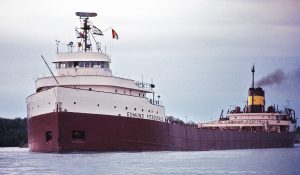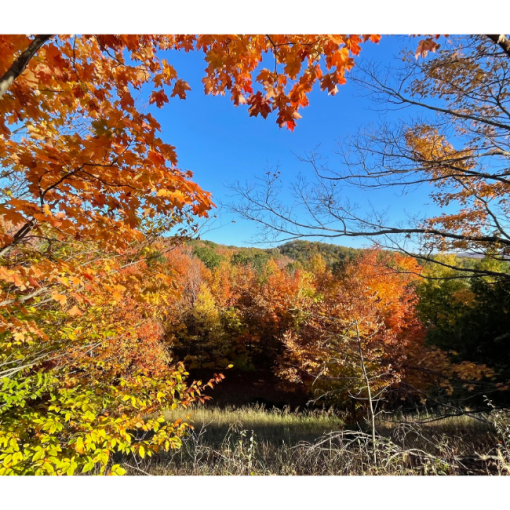
A librarian finds room on the shelf for everyone’s stories.
Here in Michigan many people are thinking back to November 10, 1975, when the Edmund Fitzgerald went down in a storm on Lake Superior. Even if you’re never been to Michigan you might heard the song by Gordon Lightfoot that’s been a radio staple for many years.
The Mariner’s Church bell still tolls 29 times, but I’ve lived in this state all my life and never heard (until recently) the story of several other people who were caught in the same storm and survived. How did I encounter this new aspect of November 10, 1975? Through a library program!
Wade Rouse, a keynote speaker at the 2025 Michigan Library Association Annual Conference, reiterated how important all types of stories are. Whether they came directly from someone are recorded by a service like StoryCorps as noted in Eberhart, are remembered, or are derived by items left behind, stories surround us. We lean on stories for support, encouragement, as a link to the past and a bridge to the future. In Rouse’s case, as they are for many other people, they are a lifeline.
Perhaps stories are even more important to those who are restricted. At the MLA Conference I was enthralled by a program at the Capital Area District Library called Connections in Corrections. The librarians noted that about 50% of the incarcerated population have children under the age of 18 and their program is an effort to break the cycle of generational low literacy while keeping families connected.
It’s imperative then, that our shelves reflect back to our community a diverse set and range of stories. It gives us all the greatest chance of making those important connections. Otherwise our community members are only viewing a partial picture. They have a hole in their knowledge, like the one I’ve experienced my whole life about November 10, 1975. When one encounters such holes it’s disconcerting, and makes one question just how many other things have been missed along the way.
Top image credit: Greenmars, CC BY-SA 3.0, https://commons.wikimedia.org/w/index.php?curid=36483480
References
Connections in Corrections. (n.d.). Retrieved November 4, 2025, from https://www.cadl.org/about/who-what-why/blog/connections-corrections
Eberhart, G. M. (2018, February 10). Sharing People’s Stories. American Libraries Magazine. https://americanlibrariesmagazine.org/blogs/the-scoop/sharing-peoples-stories/
Thompson, T. (2024, August 13). Maritime Time: Surviving the storm of Nov. 10, 1975. INTERLOCHEN. https://www.interlochenpublicradio.org/ipr-news/2024-08-13/maritime-time-surviving-the-storm-of-nov-10-1975
#hyperlib





5 thoughts on “Reflection: The Power of Stories”
Hi, Heather,
I am very familiar with the story of the Edmund Fitzgerald and the song about the incident because of my proximity to the state of Michigan. However, I am not familiar with the people who survived the storm. It was an interesting read! I like your statement, “We lean on stories for support, encouragement, as a link to the past and a bridge to the future.” It is hard to resist listening to a good story. It reminds me of being a teacher and reading a chapter book aloud to my students every day. For many students, this was their favorite part of the day, and I would frequently hear, “Just one more chapter!” I love that there is a program bringing stories to those who don’t have access to stories otherwise. Great post!
-Jenn
The power of stories is very true isn’t it? It’s been a long time since I was an elementary student but I have very vivid memories of going to the temporary classroom (it was a trailer outside) where our school had its library for a time. I can remember how the book displays looked, and listening to Fantastic Mr. Fox and Mr. Poppins’ Penguins. The bookmobile came once a month because our town didn’t have it’s own public library. Now when I’m out prepping our bookmobile it’s common for someone to stop and tell me a story about a bookmobile from their youth – it’s one of my favorite happenings. 🙂
Hey @hharrisbrady, the music started in my head as soon as I read “ Edmund Fitzgerald” 🙂
What thoughtful reflection! I appreciate how you highlight the power of libraries to uncover overlooked stories and provide a fuller picture of our shared history. Your examples really show how libraries can bridge gaps, preserve diverse voices, and create meaningful connections across generations and communities.
@hharrisbrady I so enjoyed this. I I may have mentioned this already, but we attended the National Writer Series with John Bacon, focused on his new book, The Gale of November. It was so interesting, and I immediately got the book and enjoyed it immensely. It also was incredibly emotional, and the Gordon Lightfoot song has found a place in my heavy rotation playlist, such an amazing example of songwriting. I’m so glad you highlighted this, and I appreciate these extra links.
It’s very much a piece of the Michigan fabric isn’t it? We were walking the Manistee riverfront last weekend and they have a really great history display. One of the panels noted an October storm of 1880 that wiped out 100 vessels. I guess our crazy storms are really old news in a way, and it sounds like there is another one in the making for tomorrow!